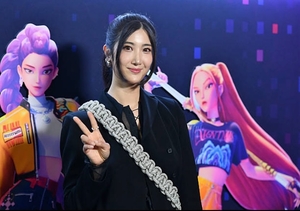
From failed K-pop debut to Netflix hit, Ejae’s journey shows resilience can rewrite the script
Everyone has a dream. Some see it through. Others are forced to let go.
For 33-year-old Korean American singer-songwriter Ejae, born Kim Eun-jae, the dream was to debut as a K-pop idol after spending 10 years training at SM Entertainment. But the call never came. Neither in a group nor as a soloist did the powerhouse label see her fit to debut.
Instead of turning her back on music, Ejae found another path — one that would lead her to co-write “Golden,” the soaring anthem from Netflix’s megahit “KPop Demon Hunters,” released in June.
The song has made history, reaching No. 1 on the Billboard Hot 100 and topping both the Billboard Global 200 and Global Excl. US charts — a rare feat for a song from an animated film soundtrack. It also claimed No. 1 on the UK Official Singles Chart, becoming the first K-pop track to do so since Psy’s “Gangnam Style” in 2012. Netflix has also reportedly submitted “Golden” for awards consideration.
Ejae’s next goal is no longer about becoming a famous singer. It is about winning a Grammy — an achievement she says would carry a meaning far beyond her own career.
“It wouldn’t just be a personal milestone,” she said. “It would be a message to every Asian American girl who’s ever felt impostor syndrome in this industry,” she said in an email interview with The Korea Herald.
From trainee to songwriter
Ejae describes her years at SM Entertainment as “incredible” and “character-defining,” instilling in her a work ethic and perseverance that would later sustain her. Learning dance and performance at such a high level also proved invaluable when she began writing for K-pop idols.
“As a trainee, I learned to think about how a song might translate into choreography or a music video,” she said. “That perspective has shaped my songwriting ever since.”

In 2011, Ejae left SM Entertainment to study at New York University’s Tisch School of the Arts. Around that time, she discovered the underground SoundCloud scene, drawing inspiration from artists like Ta-ku, Sango and Shlohmo. Making beats became both a creative outlet and a way to cope with the depression that followed her trainee years.
Her pivot to songwriting came unexpectedly.
“Some producers in Korea asked me to topline on tracks for fun,” she recalled, explaining how she started by contributing melodies. “My first song ended up being picked up by a well-known artist. That’s when I realized writing wasn’t just something I enjoyed — it was something I needed. It became my therapy.” Ejae’s trainee period at SM Entertainment ended about two years after she graduated.
Her passion crystallized in 2017 when she attended her first SM Entertainment songwriting camp. On the very first day, she penned what would become Red Velvet’s hit “Psycho,” a song born from an argument with her then-long-distance fiance. Released in 2019, the track’s success opened new doors and, eventually, led her to the opportunity that would change everything: “KPop Demon Hunters.”
Becoming Rumi and finding ‘Golden’
Ejae entered the project through composer Daniel Rojas, joining early in the creative process. Together, they wrote some of the first songs that set the tone for the soundtrack. Because she recorded most of the initial demos, the directors invited her to become the singing voice of the film’s lead character, Rumi.
“Having been part of the project from the start, I felt deeply connected to her,” she said. “As a former K-pop trainee, I related to her perfectionism, her struggle to hide her flaws and her drive to chase her dream.”
“Golden,” co-written with Mark Sonnenblick under the guidance of music director Ian Eisendrath, is a pivotal moment in the film. The song reflects each character’s struggles, while carrying a message of perseverance.
“There’s a bittersweet layer,” Ejae explained. “Rumi’s lyrics reflect her desperation to fix her patterns. It’s like her personal pep talk — telling herself not to give up and that she can reach her dreams.”

In crafting the song, Ejae also had to meet a personal challenge: hitting Rumi’s high notes to showcase her “crazy vocal skills.” The result is both technically impressive and emotionally resonant, a combination that has resonated with audiences far beyond the film.
Beyond “Golden,” Ejae is especially proud of “Hunter’s Mantra,” the film’s opening number that fuses traditional Korean genres like pansori and Arirang with modern pop sensibilities. Pansori is a traditional Korean musical storytelling performance that combines singing, narration and dramatic expression.
“I wanted to bring Korea’s rich traditional sounds into the music with my own twist,” she said. “It’s part of who I am.”
Chasing Grammy gold
For Ejae, the Grammy dream is not just about recognition — it is about representation.
“As an Asian American, specifically a Korean American woman, I don’t really see enough people who look like me in the pop and K-pop industry,” she said. “That’s why winning an award for a song about hope and chasing your dreams would be incredibly serendipitous.”
As someone who once doubted her skill and talent, fearing that she would be exposed as a fraud, Ejae has message for others who find themselves feeling the same way.
“Your voice matters. Your stories are worth telling. Don’t give up,” Ejae says. “If this song (‘Golden’) can spark even a little hope in someone to keep going, then that, to me, is the greatest honor.”